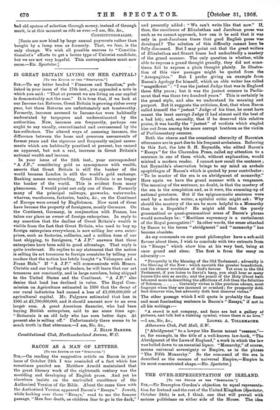IS GREAT BRITAIN LIVING ON HER CAPITAL?
rTO THE EDITOR OF THE "SPECTATOR."1
Sta,—To my letter headed "Finances and Taxation," pub- lished in your issue of the 17th inst., you appended a note in which you said : "That at present we are living on our capital is demonstrably not the case." It is true that, if we look at our Income-tax Returns, Great Britain is growing richer every year, but these Returns are unfortunately not trustworthy. Formerly, incomes assessed to Income-tax were habitually understated by taxpayers and underestimated by the authorities. Now, incomes are frequently, perhaps one ought to say usually, overestimated and overassessed by the tax-collectors. The altered ways of assessing incomes, the difference between the loose and generous assessments of former years and the rigorous and frequently unjust assess- ments which are habitually practised at present, has caused an apparent, but not a real, increase in Great Britain's national wealth and income.
In your issue of the 24th inst., your correspondent "A J.P.," considering gold as synonymous with wealth, asserts that Great Britain is still the banker of the world because London is still the world's gold exchange. Banking means moneylending. Great Britain is no longer the banker of the world. This is evident from many phenomena. I would point out only one of these. Formerly many of the principal railways, gasworks, waterworks, wharves, warehouses, factories, banks, &c., on the Continent of Europe were owned by Englishmen. Now most of these have become the property of foreigners, mostly Germans. On the Continent, Germany, in conjunction with France, has taken our place as owner of foreign enterprises. In reply to my assertion that the decline of Great Britain's wealth is visible from the fact that Great Britain, who used to buy up foreign enterprises everywhere, is now selling her own enter- prises, such as factories, collieries, and a million tons of our best shipping, to foreigners, "A J.P." answers that these enterprises have been sold to good advantage. That reply is quite irrelevant. He replies to my statement that the nation is selling its art treasures to foreign countries by telling your readers that the nation has lately bought "a Velazquez and a Frans Hals." If "A J.P." will communicate with Messrs. Christie and our leading art dealers, be will learn that our art treasures are constantly, and in large numbers, being shipped to the United States and the Continent. "A J.P." also denies that land has declined in value. The Royal Com- mission on Agriculture estimated in 1896 that the decay of our rural industries had caused a loss of £1,000,000,000 of agricultural capital. Mr. Palgrave estimated that loss in 1905 at 21,700,000,000, and it should amount now to an even hirer sum. A great American financier, who had been buying British enterprises, said to me some time ago : "Britannia is an old lady who has seen better days. At present she is selling off." Unfortunately there seems to be much truth in that utterance.—I am, Sir, &c.,














































 Previous page
Previous page